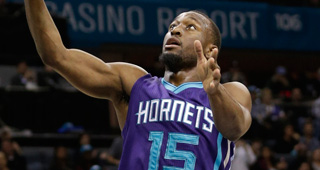Whatever’s alive in Kemba Walker is more alive than in almost anyone else, but man, Steve Clifford is Mike Budenholzer but with heads up defense rather than stultifyingly systematic offense and the Charlotte Hornets have too many competent tall white dudes to move anyone who doesn’t belong to the new moon-thin NBA/NASCAR crossover demographic. To be fair, it is Charlotte. If these people exist at all, they’re Hornets fans, and they appreciate Cody Zeller’s commitment to playing within himself.
Plus now there’s Dwight Howard, who is dead at thirty-one. Lee Jenkins has a talent for getting athletes to open up to him, but his profiles often read like sepia-toned advocacy journalism for millionaires. Dwight was never, as Jenkins posits towards the end of a somber redemption-in-the-making yarn, the baddest dude in the NBA, and it’s doubtful that Dwight regularly visits the spot where his childhood home used to be before it burned down and pictures where the basketball hoop used to be in the backyard. Howard’s problem—aside from his deteriorating body and a league that’s moving away from traditional big men, which are the primary reasons he’s currently out of favor with everyone except Michael Jordan—is precisely this kind of faux reflectiveness. He might acknowledge his past mistakes out loud and everybody grows to some degree between ages eighteen and thirty, but he still rubs people around him the wrong way because he’s disingenuous. He always claims one thing and does another. Give him twenty games with the Hornets and New Dwight 4.0 will be complaining about his lack of post touches, no matter how many he’s actually getting.
Even if we played pretend and said Charlotte will be the stage for a modest revival of a player whose post-Orlando career has been mostly aggravating and scans like a script the Coen Brothers ditched after thirty pages for being too condescending and broad—what does a reclaimed Dwight Howard look like anyway? Nice rim protection, a bunch of rebounds, and some dunks? That’s DeAndre Jordan, who’s nobody’s favorite player, and he’s actually a pretty likable guy. No, Dwight Howard, humbled or just acting like it, is the friend you can’t shake, and the Hornets are the two Saturday afternoons a year he pins you down, when you can’t lie and say you’re at a wedding. Also, the farm he bought outside Atlanta sounds lovely.
If there’s good news, it’s that Dwight can’t ruin the Hornets. There’s not much to ruin. They’re one of the least-loved franchises in the league, probably because they’re in a medium-sized southern city that isn’t exactly NBA-mad, and because they’re competently run but not exciting. Kemba has his moments, but Steve Clifford’s crew is mostly about patience and discipline. They don’t beat themselves, which is an admirable trait and it’s something basketball writers have used to explain the greatness of Gregg Popovich and his Spurs, but we don’t like the Spurs solely because they’re smart. We like them because they’re frequently one of the best two or three teams in the league, which is to say they have really good players who do spectacular things. Our appreciation for a keenly defended pick-and-roll only goes so far. We need to be surprised once in awhile.
Malik Monk keeps mentioning, in damn near every interview, that he’s upset about the Knicks passing on him in the draft, which is beginning to sound less like ...and I’m going to shove it in their faces and more like ...and I really, really wish they hadn’t because I don’t want to be in Charlotte with each utterance.
If this sounds like a franchise falling apart, it’s not. The Hornets’ utter togetherness is what makes them, if not lamentable, then hard to truly like or discuss. They are an impenetrably functional franchise, which is a slightly strange thing to say about a team that missed the playoffs last year, but they played about as well as they possibly could have. We can poke fun at Michael Jordan and Rich Cho for drafting Frank Kaminsky over Justise Winslow, but over two seasons, Clifford has molded Kaminsky into a decent bench big. Michael Kidd-Gilchrist has zero-foot range and Clifford has figured out how to make the most out of him as a slasher, rebounder, and switchable defender. The Hornets work what are not and don’t look at all like miracles, but they’re experts at quiet optimization.
Perhaps that is the most generous way of understanding them: they are nobody’s fault. Kidd-Gilchrist isn’t Draymond Green, but he’s doing his best. Kemba Walker isn’t Dame Lillard, but it’s not for lack of trying. The Hornets exist at the limits of exactly how far effort and intelligence can take a team. If Dwight Howard is going to work out anywhere, he’ll work out in Charlotte. But to what end? There’s always an underlying sourness to labor that isn’t inspirational, to art that’s well-made but still boring. Maybe there shouldn’t be, but then you don’t plan to watch many Hornets game this year either, do you?
More Futures: Atlanta Hawks, Boston Celtics, Brooklyn Nets, Chicago Bulls, Cleveland Cavaliers, Dallas Mavericks, Denver Nuggets, Detroit Pistons, Golden State Warriors, Houston Rockets, Indiana Pacers, Los Angeles Clippers, Los Angeles Lakers, Memphis Grizzlies, Miami Heat, Milwaukee Bucks, Minnesota Timberwolves, New Orleans Pelicans, New York Knicks, Oklahoma City Thunder, Orlando Magic, Philadelphia 76ers, Phoenix Suns, Portland Trail Blazers, Sacramento Kings, San Antonio Spurs, Toronto Raptors, Utah Jazz, Washington Wizards



